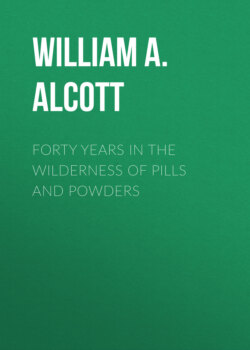Читать книгу Forty Years in the Wilderness of Pills and Powders - William A. Alcott - Страница 49
На сайте Литреса книга снята с продажи.
THE MEDICINAL EFFECTS OF STORY TELLING.
ОглавлениеTable of Contents
My aged father sickened about this time, and remained in a low condition many months. I was at a distance so great, and in circumstances so peculiar, that I could not see him often enough to become his medical adviser. Besides, in my then unfledged condition as a disciple of Galen, I should not have regarded myself competent to the discharge of so weighty a responsibility, had I even been at home with him. The result was that he employed his family physician as usual, and went through, as might have been expected, with the whole paraphernalia of a dosing and drugging campaign.
Among other troubles, or rather to cap the climax of his troubles, he was exceedingly low-spirited. Confined as he had been to the house almost all winter, and seeing nobody to converse with—no new faces, I mean—was it very strange that his mind turned, involuntarily, to his complaints, and preyed upon itself, and that he was evidently approaching the deep vortex of hypochondria? Medicine did him no good, and could do him none. It is true he had, after three months, almost left off its use; but the little to which he still clung was most evidently a source of irritation.
My own occasional visits, as I soon found out, did him more good than any thing else. This gave me a needful hint. Near him was an old Revolutionary soldier, full of mirthfulness, and a capital story teller. Unknown to my father, and even to the family, I employed this old soldier to visit my father a certain number of evenings in each week, and tell stories to him.
Sergeant K. complied faithfully with the terms of the contract, and was at my father's house three evenings of each week for a long time. This gave the old gentleman something else to think of besides himself, and it was easy to see, did him much good. During the progress of the fourth month his improvement became quite perceptible; and in another month he was nearly recovered.
But, as I have repeatedly said of cold water, and indeed of all other remedial efforts or applications, whether external or internal, and whether moral, mental, or physical, too much credit should not be given, at least hastily, to a single thing. The opening spring was in my father's favor, as well as the story telling. The bow, so long retained in an unnatural position, on having an opportunity, sprung back and resumed its wonted condition. Still, I could never help awarding much credit to the Revolutionary soldier.
Most persons must have observed the effects which cheerfulness in a medical man has on his patients. The good-natured, jolly doctor, who tells a story now and then, and cracks a joke and has occasionally a hearty laugh with you, or at you, about something or nothing, will do you much more good, other things being equal, than the grave, staid, sombre practitioner, who thinks it almost a sin to smile, especially at the sick-bed or in the sick-room.
I think story telling, as an art, should be cultivated, were it only for its good effects in sickness. But this is not all. Its prophylactic or preventive tendencies are much more valuable. Few people know how to tell a story of any kind; while others, in some few remarkable instances, such as I could name, will make a story of almost any thing, and bring it to bear upon the precise point or end they wish to accomplish. It is yet, in reality, a mooted point, which could make the deepest, or at least most abiding, impression, Daniel Webster by a Congressional oration, or Jacob Abbott by a simple story. If this is an indirect or incautious confession of medical imperfection or impotence, let me say as Patrick Henry once did, in Revolutionary days, "then make the most of it."
While on this topic of story telling, I must not forget to allude to its moral effects. Lorenzo Dow, the eccentric preacher, is not the only pulpit occupant who has acquired the art of "clinching the nail," in his discourses by a well told story. It was quite a habit, in former times, with certain preachers of certain denominations of Christians, whose sermons were chiefly unwritten, to tell stories occasionally. And I appeal to Father Waldo, late chaplain in the United States Senate, to see whether the effects of these discourses were not as deep and as lasting, to say the least, as many of our modern sermons, which, while they smell much more of the lamp, fall almost lifeless upon the sleepy ears of thousands of those whom Whitfield by his more practical course would have converted.
